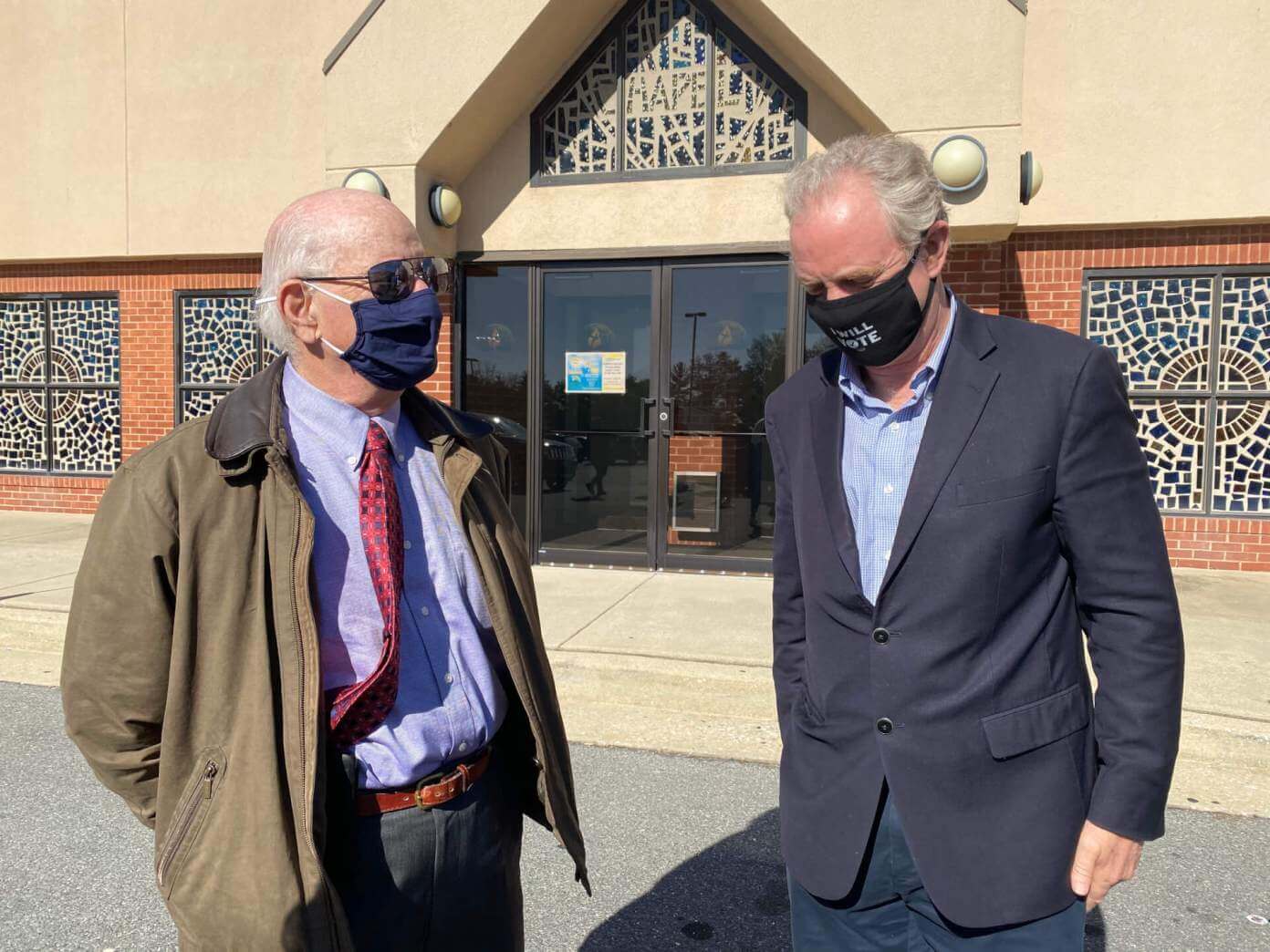Hogan Praises Bipartisan Push for Pandemic Relief as Md. Senators Seek Additional Funding to Aid Jobless

More than a dozen U.S. House and Senate members are pushing for a bipartisan coronavirus relief package to aid struggling states and local governments and fund programs such as unemployment and rental assistance that are set to expire later this month.
In a Tuesday news conference, lawmakers unveiled a four-month, $908 billion proposal that would fund transportation, the paycheck protection program to help businesses pay their employees, food assistance and coronavirus testing centers.
The package, which falls short of another pushed by House Democrats, would include $160 billion for state and local governments, $82 billion for education and $45 billion for transportation, including airlines, according to a chart from Sen. Joe Manchin (D-W.Va.).
Sen. Mark Warner (D-Va.), said the package would be retroactive to Dec. 1 and last until March 31.
“It’s not going to make everybody happy, but there’s been an enormous amount of work done,” Warner said about the relief proposal.
While it’s not clear whether the proposal has the support of any legislative leaders or the White House, the renewed push for aid comes at a critical time as infections spiral in many states.
More than 268,000 Americans have died from coronavirus and more than 13 million are infected. Maryland reported 2,765 new cases on Tuesday, and has seen 1,000 or more new cases for 27 consecutive days.
The pandemic has pushed the country into a recession as more than 11 million people have filed for unemployment, according to the Bureau of Labor Statistics.
Sen. Bill Cassidy (R-La.) said Congress needs to pass a coronavirus relief package before the end of the current legislative session in early January. Some programs that are expected to lapse Dec. 26 include $150 billion in federal funding for state and local governments, a deferment on student loans, a federal eviction moratorium, and unemployment insurance for gig workers, among other unemployment benefits.
Cassidy added that House Speaker Nancy Pelosi (D-Calif.) who is pushing for at least a $2 trillion relief package, has not said whether she supports the bipartisan proposal and neither has Senate Majority Leader Mitch McConnell (R-Ky.).
“We have not had assurances from them on that vote, but I think the American people will put the pressure, showing that there’s a group of us coming together that this needs to be done,” Cassidy said.
Other senators at the news conference: Republicans Susan Collins of Maine, Lisa Murkowski of Alaska and Mitt Romney of Utah; independent Angus King of Maine; and Democrats Maggie Hassan and Jeanne Shaheen of New Hampshire.
Maryland Gov. Lawrence J. Hogan Jr. (R), who has been agitating for a bipartisan agreement on COVID-19 relief funding on Capitol Hill, said at a State House news conference Tuesday that he has been “trading phone calls with some of the senators who are part of that compromise.”
Hogan said he could not predict whether the bipartisan effort would gain any traction in Congress this month, and he acknowledged that some of the provisions of the compromise plan don’t do enough to solve the myriad problems caused by the virus and the economic crisis.
“It’s not enough, but it would be better than nothing,” he said.
The Manchin chart showed that the plan would include $35 billion for a health care provider relief fund, $26 billion for nutrition and agriculture, $25 billion for rental housing assistance and $16 billion for vaccine development and distribution.
The House passed its $2 trillion coronavirus relief package in October, but McConnell refused to bring that bill to the Senate floor for a vote and pushed a Senate GOP alternative.
While McConnell has not agreed to bring up the package put forth by the bipartisan group, he said on the Senate floor Monday that he was open to passing another coronavirus relief package.
“There is no reason, none, why we should not deliver another major pandemic relief package to help the American people through what seems poised to be the last chapters of this battle,” he said.
One in six restaurants—or more than 100,000—have closed due to the pandemic, according to a September survey collected by the National Restaurant Association, a group that represents the restaurant industry.
Cassidy, who has previously pressed the Senate to pass an emergency COVID-19 relief package, said the bipartisan plan would create “a pathway forward to bring relief to the unemployed, to the small businesswoman, the small businessman struggling to hang on until the vaccine is widely used, to the doctors and the nurses who are on the frontlines with a third wave of the disease.”
House members of the Problem Solvers Caucus, a bipartisan group that Hogan has also met with, also attended the Capitol Hill news conference Tuesday.
Additionally, 32 Democratic senators, including Benjamin L. Cardin and Chris Van Hollen of Maryland, sent a letter Monday to McConnell and Senate Minority Leader Chuck Schumer (D-N.Y.), asking them to include the expansion of two programs in the next relief package—Pandemic Unemployment Assistance and the Pandemic Emergency Unemployment Compensation Program. One assists those not normally eligible for unemployment and the second extends payments to those who have exhausted their benefits.
“Right now, there are more than twice the number of Americans participating in these two programs combined as there are in the regular state unemployment system,” the senators wrote. “In other words, roughly 12 million American workers will lose benefits this season for a job they lost through no fault of their own.”
Maryland Matters reporter Josh Kurtz contributed to this report.




 Creative Commons Attribution
Creative Commons Attribution